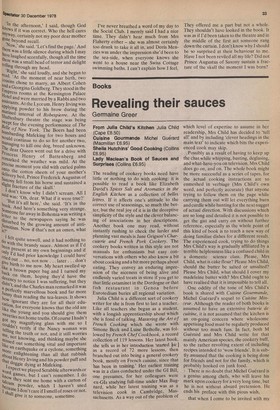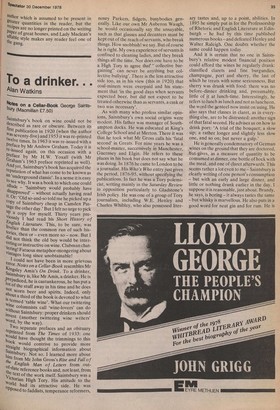Books
Revealing their sauces
Germaine Greer
From Julia Child's Kitchen Julia Child (Cape £8.50) Cuisine Gourrnande Michel Guerard (Macmillan £6.95) Sheila Hutchins' Good Cooking (Collins £6.95) Lady Maclean's Book of Sauces and Surprises (Collins £6.95) The reading of cookery books need have little or nothing to do with cooking: it is possible to read a book like Elizabeth David's Spices Salt and Aromatics in the English Kitchen as a collection of belles lettres. If it affects one's attitude to the correct use of seasonings, so much the better, but the real joy of it is in the deceptive simplicity of the style and the clever balancing of associations in her descriptions. Another book one may read, without instantly rushing to check the larder and planning vast meals is Jane Grigson's Charcuterie and French Pork Cookery. The cookery books written in this style are not manuals for enthusiasts but easy conversations with others who also know a bit about cooking and a bit more perhaps about eating. They convey an enduring impression of the niceness of being alive and endlessly varied treats in store if you get to that little estaminet in the Dordogne or that fish restaurant in Genoa before Eurotedium buries all regional variation.
Julia Child is a different sort of cookery writer for she is from first to last a teacher. Like all teachers she began as a student, with a longish apprenticeship about which she is fond of talking. Mastering the Art of French Cooking which she wrote with Simone Beck and Luise Betholle, was followed by French Chef Cookbook, a record collection of 119 lessons. Her latest book, she tells us in her introduction 'started [sic] as a record of 72 more lessons, then branched out into being a general cookery book, mostly on French cuisine, since that has been in training.' Her earliest training was in a class conducted under the GI Bill, one presumes, for her colleagues were ex-GIs studying full-time under Max Bugnard, while her latest training was as a television cook in Cambridge, Massachusetts. As a way out of the problem of which level of expertise to assume in her readership, Mrs Child has decided to 'tell all' and by including 'clever headings in the main text' to indicate which bits the experienced cook may skip.
Possibly as a result of having to keep up the chat while whipping, basting, deglasing, and what-have-you on television, Mrs Child does go on, and on. The whole book might be more successful as a series of tapes, for the actual cooking instructions are so enmeshed in verbiage (Mrs Child's own word, and perfectly accurate) that anyone trying to follow them on the page while carrying them out will let everything burn and curdle while hunting for the next nugget of actual direction. With discussions which are so long and detailed it is not possible to get the gist and carry on without further reference, especially as the whole point of this kind of book is to teach a new way of doing familiar dishes for a different result. The experienced cook, trying to do things Mrs Child's way is gradually affiliated by a terrible helplessness like a confused child in a domestic science class. Please, Mrs Child, what is cake flour? Please Mrs Child, should the butter be salted or unsalted? Please Mrs Child, what should I cover my madeleine batter with? Mrs Child ought to have realised that it is impossible to tell all.
One oddity of the tone of Mrs Child's book is shared with Cuisine Gourmande, Michel Guerard's sequel to Cuisine Minceur. Although the reader of both books is assumed to have an extensive batterie de cuisine, it is not assumed that the kitchen is an on-going concern where wholesome appetising food must be regularly produced without too much fuss. In fact, both NI Guerard and Mrs Child write for that mainly American species, the cookery buff, to the rather revolting extent of including recipes intended to 'wow friends'. It is subtly assumed that the cooking is being done for friends and not for the family, which is probably hooked on junk food.
• There is no doubt that Michel Guerard is a genius among chefs, who will leave his mark upon cookery for a very longtime, but he is not without absurd pretension. He ends his preface with this pious wish, that when I come to be invited with my fellows to the Lord's table behind those other clouds, I shall have the courage to ask him whether He will let me serve for an eternity as an apprentice in the great angels' kitchen. And above all, to let me taste his latest creation!
A more elaborate way of comparing the chef's office with Divinity could hardly have been devised.
A book which includes six recipes for foie gras, the enlarged duck livers of the Landes, and uses freshwater crayfish with gay abandon, not to mention sea-urchins, frogs' legs, lobsters and truffles, so that nearly every recipe contains one unobtainable ingredient, must primarily serve as reading matter, but this is one book which gives minute and very clear instructions and little else. The author's predilection for Maggi stock cubes, with their unmistakable lashing of salt and monosodium glutamate sorts ill with the expensive ingredients. Worst of all perhaps, because freshness and light, meticulous and varied processing is the secret of Guerard's cuisine whether gourmonde or mince, most of the work must be done in the last half hour. Anyone serving a four-course dinner gourmande can hardly do so without help, and is quite unable to receive guests or make them welcome. A word must be said also about the ugliness of the book as a physical object. Many of the dishes are actually shown in rogue's gallery mug-shots, food full-face as it were from overhead, which has much the same effect as the distressing Anglo-Italian habit of thrusting congealing piatti pronti in the faces of would-be diners. Clumsy drawings, and foggy atmospheric still life photographs of different kinds of food have done nothing but raise the price of the book. To turn from such a subtle and individual style of cooking to Sheila Hutchins's Good Cooking: The English Tradition, is to incur rather severe culture shock. There have been good books on English Food by Jane Grigson, Michael Smith and Elizabeth Ayr' ton, but it is doubtful whether Sheila Huth" ins will join their number in rehabilitating English cookery among the cuisines 0.1 Europe. Her concern to give the basic recipe as used in the regions where the dishes originated results in an unappetising succession of oddities which may be the addiction of those who grew up with them, but reading about marrow toast, or grilled pig's kidney eaten with blanched bacon roasted before the drawing room coal fire, or grilled bloaters topped with mashed potato puts one in mind of the culinarid squalor of country hotels. Nothing WOO' induce this reader at any rate to cook.° marrow as big as a bathroom loofah la either parsley or cheese sauce; and heaven knows where the dear lady got the idea that courgettes do not grow very large, or that they should be cooked for thirty minutes" The constant use of the abominable verb t° boil is a little disheartening, but one can only be grateful to Sheila Hutchins for supplying us with the English for boarlue,,t gat:nt: pot posy, a delightful name and muo easier on the tongue. Moreover, Sheila Hutchins has one virtue in common with Michel Guerard, she gives ideas about methods and combinations which would not at first occur: her desertl''. tions of shellfish cooked in meat broth inspired this cook anyway to try mussels in beef broth, a combination which is une%pected but truly delicious. Lady Maclean's Book of Sauces and Surprises is not only a very interesting che; tionaty of sauces, with so wide a range tha, it includes one of Dame Edna Everage s own recipes for marmalade mayonnaise ('Simply fold about 75g/3 oz sieved mar' malade into the mayonnaise'), it is also the clearest discussion of the making of stocks, bouillons and roux that this reader had eveL encountered. The idea of sauces as blarike' for food cooked without reference to theta is a repulsive one, but it is after all the principle upon which professional kitchens are organised (except those which areal/0,e or gourmande, of course). Lady Maclean ls so much more aware of the pressure on t,11.tie home cook to get the show on the road via" the minimum of tall hattery and Poll apronry, that her book may well apPee. more than any of the others to the exPerI,enced home cook. She is also responsihle for an idea of the most staggering simplicIti which had never occurred to me at any rate. Stock may be made at leisure, deep froze° in ice trays, and stored in plastic bags to be, used at will. Such a procedure is to this coo" greatly preferable to destroying fine jingle: dients in essence of Maggi. Lady Maclean ' Book is sophisticated, learned, Osmopolitan, clear and even sometimes Witty' There is still the tinge of snobbery in the author which is assumed to be present in greater quantities in the reader, but the recipes are no longer printed on the writing Paper of great houses, and Lady Maclean's affable style makes any reader feel one of the gang.
























































 Previous page
Previous page